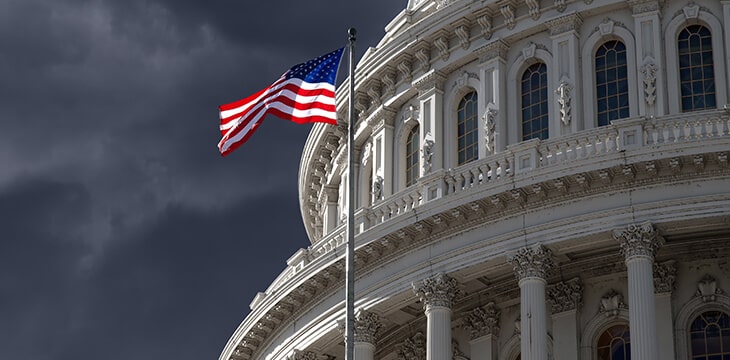|
Getting your Trinity Audio player ready...
|
The digital currency industry experienced somewhat of a meltdown over the course of the last few days due to a clause in the Biden administration’s Infrastructure Bill. Some of the loudest voices in the space claim the proposed requirements place impossible demands on various elements within the industry to collect information on and report customers’ tax obligations.
After lots of jousting and negotiation, which saw panic-stricken speculators mobilize like never before, two amendments were put on the table, with the Biden government backing the one most of the industry is dead against.
The final vote to decide which amendment will pass has not yet taken place, but it’s going to happen soon, and the vote will determine the legal fate of many projects in the United States for a long time to come.
What is being proposed? What are the suggested amendments?
The proposal in the Infrastructure Bill requires ‘brokers’ in the digital currency industry to collect information on and report customers’ tax obligations to the government. The definition of brokers as written would include everything from validators to developers to DeFi lending platforms and more.
Realizing the weight of the proposed obligations, the industry quickly responded with a lobbying campaign that saw two proposed amendments tabled.
- The first proposed amendment was tabled by Senators Rob Portman and Mark Warner. If this amendment passes, it will exempt proof-of-work validators and developers from being considered brokers.
- The alternative amendment was brought forward by Senators Ron Wyden, Pat Toomey, and Cynthia Lummis. It would exempt a much wider group of miners, validators, and developers from the new obligations.
Digital currency industry big-wigs, from Coinbase CEO Brian Armstrong to Square CEO Jack Dorsey, took to social media to warn followers of the consequences of the new proposals and mobilize them to ask their Senators to back the Wyden- Lummis-Toomey amendment. They claimed that the alternative would effectively kill much of the industry in the United States and force innovative companies offshore.
10/ Contact your Senators and urge them to vote for the Wyden-Lummis-Toomey amendment and vote NO on the Warner-Portman amendment. Let’s keep crypto alive and thriving, we’re just getting started. https://t.co/gCPISrQSxQ
— Brian Armstrong (@brian_armstrong) August 6, 2021
To @RonWyden, @SenLummis, @SenToomey, @MarkWarner, @SenRobPortman, @SenatorSinema, @TedCruz, respective staff & everyone who’s worked on the Infrastructure Bill “Crypto Tax Reporting” provision: thank you for your work to get this right.
May we offer a workable simplification?
— jack (@jack) August 8, 2021
Which amendment will pass remains to be seen, but the White House threw its weight behind the Portman-Warner amendment. Critics claim Biden is picking winners and giving proof-of-work protocols an unfair advantage.
Panic as the law comes knocking
The initial inclusion of digital currencies in the infrastructure bill caused widespread panic, outrage, and claims of unfairness on social media and in the press. As these things tend to do, they rapidly devolved into conjecture and conspiracy theories on social media.
For example, Ryan Selkis, who founded the research firm Messari, claimed that this was part of a two-pronged strategy to ban digital currencies. He claimed that first, the government would favor proof-of-work and make life impossible for proof-of-stake projects, and then it would ban Bitcoin and other proof-of-work protocols based on environmental concerns.
https://twitter.com/twobitidiot/status/1423473696073822216?s=20
If only Mr. Selkis understood that Bitcoin is green technology, and if small-blockers had gone with maximizing transactions, therefore making Bitcoin less energy-intensive per transaction, this fear could have been avoided altogether.
Others made various unfounded claims ranging from Treasury Secretary Janet Yellen being a white-collar criminal to the United States losing its place as the world’s financial epicenter. Of course, few mentioned how the various amendments would impact their own ‘investments’ in various digital assets.
Contradictions in the narrative begin to show
What’s most confusing about all of this is that most of the loudest advocates of BTC, Ethereum, and other high-profile digital currencies claim that ‘crypto’ is decentralized, anonymous, and therefore beyond the reach of government and the law. Some have even claimed that the government would have to “ban math” to enforce law on the industry, so why the sudden panic?
A similar outburst happened recently when the European Union proposed new rules to make everyone from digital wallets to exchanges comply with AML/KYC laws.
The reaction to both raises two questions:
- If so-called cryptocurrencies are really beyond the reach of the law, why panic about the proposed changes? Can’t these renegades and rebels just ignore the outmoded and outdated governments of the world?
- If it is true that illegal activity accounts for a very small percentage of transactions in the space, why is there a problem with KYC/AML laws and tax reporting obligations?
Have the people who claim that the law has no bearing on this industry been lying, or do they just not understand what they’re talking about? Either way, it appears they’ve had a much-needed reality check in the United States, and it will be difficult to return to the “code is law” narrative whatever happens.
BSV enterprise blockchain is ready
One camp that didn’t flinch during this entire episode is the people building on BSV enterprise blockahin. That’s because it has been built to comply with all existing financial regulations and laws from day one.
Developers, validators, and everyone else associated with BSV have had a strong commitment to the law from the outset. Whatever laws apply, and whatever amendments end up passing, BSV stands ready. It’s a stable protocol that developers can rely on to be legally compliant now and in the future.
https://youtu.be/MJYUAK3GgP4

 02-15-2026
02-15-2026 




